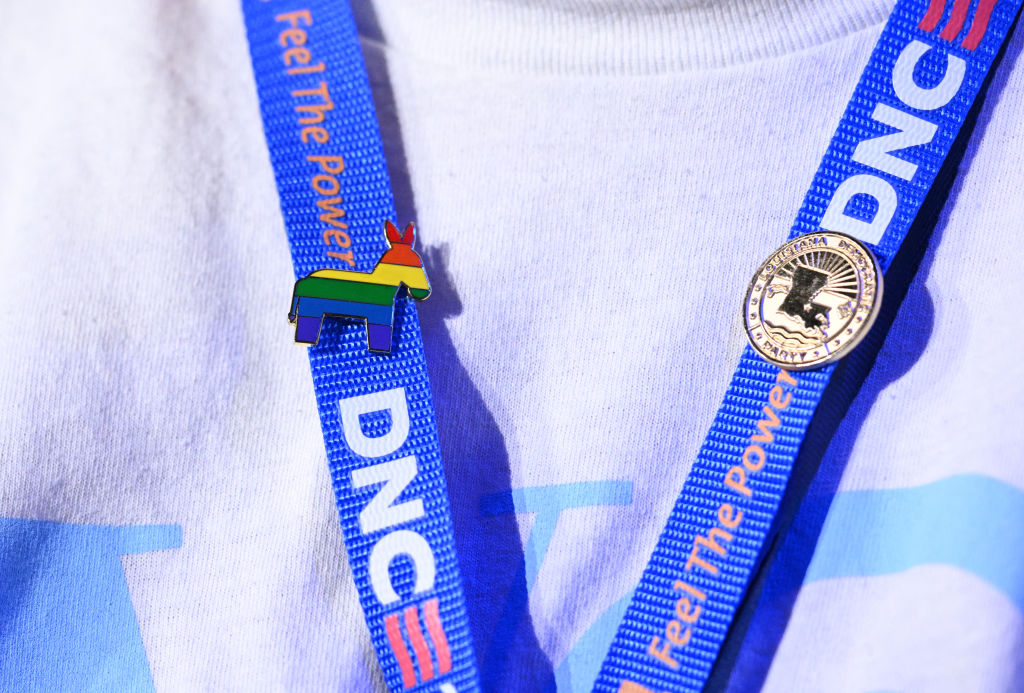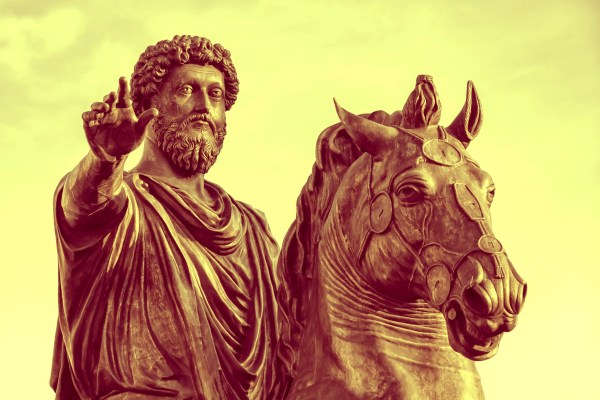Dear Reader (expect for those of you in a slippery situation),
We make fun of Steve Hayes for many things here at The Dispatch. One of them is his dislike of provocative, or even clever, headlines. I think there was something in the water back at the old Weekly Standard, which inventively called its parody feature … “Parody.” Then again, that might have made sense given that when the editors indulged their creative headline writing instincts, they’d come up with stuff like “Corzine for a Bruisin’.” So maybe sticking to a truth-in-labeling approach to headlines was a sign of self-awareness and restraint.
Hopefully you can forgive some old-school intramural ribbing from a longtime National Review guy.
In the meantime, what made me think of this was a fun headline from The Nation: “Protesters Demand Action From Feckless Democrats.”
It’s no “Headless Body in Topless Bar,” but it’s got some punch and accuracy to it.
I found the article about the protests outside the Treasury Department via my friend Jim Geraghty, who spotted this gem in the piece (emphasis mine):
As one after another member of Congress outlined the horrors perpetrated by Musk and his team of tech lackeys, protesters would shout back, “Arrest them when they come out!” and “Lock him up!” As the speeches continued, one especially plaintive chant took hold in the crowd: “Tell us what to do!”
That’s a pretty good summary of the plight of the Democrats these days. The only thing that would have really completed the scene is if the elected Democrats speaking to the crowd chanted back, “You tell us! Because we don’t have a clue.”
There’s a lot of sweet, sweet, rank punditry about the plight of the Democrats—if you look for it. It’s easy to miss while Elon Musk’s minions treat the federal bureaucracy like they’re celebrating Caddy Day at the Bushwood Country Club and Donald Trump floats the idea of turning Gaza into a Jimmy Buffett resort.
Wastin’ away again in Gazaville
Waitin’ for Allah to turn the Jews into pillars of salt
[Salt! Salt!]
Some infidels claim we’re the ones to blame
All I know it’s the Zionists’ fault
Sorry about that.
I think people are underestimating the problem facing the Democratic Party. I think it’s much more fundamental than mere messaging or strategy. But let’s get there by sticking with the punditry for a bit longer.
The Democratic Party hasn’t been this unpopular in decades. It lost the White House, the House (albeit narrowly), and the Senate. It lost ground among pretty much every demographic group, which has to hurt for a party so obsessed with demographic groups.
This week, the Democrats elected a party technocrat and apparatchik, Minnesota Democratic Chair Ken Martin, to run the national party. Martin insists that they really don’t need to change much. “Anyone saying we need to start over with a new message is wrong,” he told the New York Times. “We got the right message.”
Quick, what was the Democrats’ message in 2024? It’s an honest question, because I really don’t know. I couldn’t even remember what Kamala Harris’ slogans were. I still remember “I’m With Hillary” and “It’s Her Turn,” but I had to google for a bit to remember “When we fight, we win!” and “We’re not going back!” Are these the messages that Martin thinks the Democrats can win on if they just put more money behind them?
Slogans are supposed to conjure deeper philosophical or ideological commitments and passions. Other than the implied anti-Trump message in, “We’re not going back,” the only conceptual superstructure I can identify is partisan team spirit. In other words, the “we” is basically just the Democrats or maybe “progressives,” or perhaps those of us who are not them. But that’s about it.
In politics, broadly speaking there aren’t that many organizing principles, or ideological frameworks, that work at scale. I mean stuff like imperialism, nationalism, or socialism. Ideas that can pull adherents in from a broad and diverse population.
I guess the oldest is some form of tribalism: We’re the people of this valley. We’re not the mountain people or the river people or those stinking nomads. We’re us, and everybody else is them.
As civilization progressed more sophisticated versions developed. We’re the Romans, or the Etruscans, or Athenians. That kind of thing. Later it was the Christians, or the Muslims, etc.
With the rise of modern nationalism, the idea of the nation obviously became one of these categories or creeds of self-identification. Not long after nationalism arrived, socialism burst on the scene. Another category that emerged around this time might be called liberalism. And liberalism—the idea of individual rights, the rule of law, freedom from the state or hostile religious authorities—is an idea you can build a political movement around. These are all big ideas that inform how we understand the role of the state, but also how we should organize society more generally.
Now, you can certainly find all of these in pure forms from ideologues and activists. But the truth is most ideologies borrow bits and pieces from each other. Historically, most nationalists were socialists. And when push came to shove, most socialists were also nationalists. Most early liberals were also nationalists of a kind. They wanted their respective nation-states to be liberal. It makes sense when you think about it, because the nation-state has a defined boundary—both in terms of physical borders and conceptually in terms of where the state has authority and where it doesn’t. You can preach about workers of the world uniting, but workers are also Italians, Germans, Belgians, etc. And their respective governments only have authority within those borders.
How ideology works.
Ideology doesn’t just inform policy positions and language. An ideology is also a worldview, which is why many dictionaries treat them as synonyms.
Progressive ideology, broadly speaking, is historically very materialist. Doctrinaire Marxism, of course, is almost pure materialism. The means of production, and their ownership, defines the form and shape of civilization. Religion, nationalism, and other prisms are distractions, myths, “opiates” of the masses, and all that nonsense. What matters is stuff like money, food, housing, and material conditions, on the job and off. Contrary to a lot of right-wing hyperbole, not all progressives are committed Marxists. Indeed, very few of them are. But, broadly speaking, this focus on material circumstances informs progressive ideology deeply, and that’s fine. It’s not like that stuff doesn’t matter. Indeed, it matters a lot. My objections to the progressive approach to public policy is not the desire to improve the material conditions of the poor or the working class. Most conservatives care about that stuff, too. We just disagree about the best ways to pursue similar goals.
Anyway, for most of the last century or so progressives, broadly defined, saw politics through a largely materialist lens. Poverty was the all-purpose root cause for social ills. Everything flowed from that. FDR turned the state into a giant wealth-transferring machine—from Social Security to the first welfare programs to all of those government jobs and public works projects. The government was now in the business of redistributing wealth. The Great Society was a continuation of this framework. It wasn’t socialism per se, but welfare-state liberalism drew on many of the same foundational assumptions. America’s freedom-loving, you’re-not-the-boss-of-me cussedness prevented it from ever accepting socialism outright. But Americans ultimately accepted the idea that the wealth-creating features of capitalism would be yoked to a large amount of redistribution. I can criticize the excesses and errors all day long, but at the end of the day I subscribe to that basic idea of a capitalism-funded safety net or welfare state, just like almost everybody else.
In certain academic and ideological corners of progressive thought, this understanding started to get supplanted by what we can call here “intersectionality.” Race and gender, and the related ideas of “oppressor-oppressed” ideology, supplanted the old New Deal/Great Society paradigm. The left still believed in a generous welfare state but grew bored talking about it. Things like anti-racism, the 1619 Project, DEI, were what drew passion and energy on the left.
I don’t think this is particularly controversial. You could see it almost in real-time. Social democrats like Bernie Sanders, who is totally in his comfort zone talking about Medicare for All, had to start talking in the language of race and marginalized groups. He used to denounce “open borders” as a crazy libertarian Koch Brothers kind of idea, but the Democratic Party convinced itself that immigrants were now part of the coalition of the oppressed and they had the right to entry into America based upon their oppressed or marginal status.
In 2019 when he announced he was running for president, again, he was asked how he’d stand out in such a diverse field. “We have got to look at candidates, you know, not by the color of their skin, not by their sexual orientation or their gender and not by their age,” Sanders replied. “I mean, I think we have got to try to move us toward a non-discriminatory society which looks at people based on their abilities, based on what they stand for.”
Not bad.
The left ate him alive. Even Stephen Colbert mocked him. “Yes, like Dr. King, I have a dream—a dream where this diverse nation can come together and be led by an old white guy.”
That sort of thinking, call it wokeism for want of a better shorthand, ran riot in elite culture and provided the foundation for the vast bulk of the culture war fights of the last decade. Some of those fights were stupid. Some weren’t. Sometimes the left had good arguments and facts on their side, but more often, in my opinion, they didn’t. The Rawlsian liberalism of the left ran head first into the traditional liberalism of American culture—and lost. I think that’s why the “vibe shift” seems so much larger than warranted by the election returns.
For instance, this week Trump signed an executive order to keep transgender athletes from competing in girls’ and women’s sports. It was, in the words of CNN’s Harry Enten, “probably the most popular thing he’s ever done.” Large majorities of Independents and Democrats support it.
One can exaggerate the significance of this, but symbolically, the message is pretty clear. The intersectional argument just doesn’t work as an organizing principle for politics—at scale. I want to be really clear: I’m not saying that bigotry is in the driver’s seat. I don’t think Americans would support a Jim Crow-style regime for transgender people. It certainly wouldn’t support a Jim Crow-style regime for non-whites, or gays, or anything like that. But what turns off lots of Americans is special treatment—real or perceived—for specific groups. That goes for positive treatment and negative treatment. Allowing biological males to compete in women’s sports simply seems unfair—one might even say “illiberal”—to many Americans, regardless of party affiliation. (See The Fair Jessica on this).
Intersectional progressives see the dismantling of DEI as oppressive and discriminatory. Oppressed groups deserve special treatment—“equity” not just “equality.” So the removal of a subsidy is indistinguishable from discrimination in their worldview. But that’s not how large numbers of Americans see it. America is a liberal country and culture. Inherent in that liberalism is the idea that we’re all equal in the eyes of God and government, and that means the state should not be in the business of picking winners and losers—based on race or creed or gender identity. (This is why the more extreme right-wing post-liberal schemes will fail. Americans will bristle at special treatment for certain faiths just as much as they bristle at special treatment for certain races or sexual orientations.)
It’s fine if you disagree with that. There are good arguments to be made about where to draw lines.
But the simple fact is that as a practical political matter, the intersectional arguments have, at least for the time being, reached the point of diminishing returns. To reduce it to a simple point, calling Latinos “Latinx” repels more Latino voters than it attracts.
Which brings me back to the Democrats.
At a forum for candidates to chair the Democratic National Committee, Jonathan Capehart asked the contenders, “So, I’m going to have a show of hands. How many of you believe that racism and misogyny played a role in Vice President Harris’ defeat?”
All eight candidates raised their hands.
Capehart replied, “Okay. So … That’s good, you all passed.”
Now, I’ve joined in the mockery over this. I love the idea that Capehart is some kind of official gatekeeper. Answer the riddle of the Sphinx or you shall not pass. But I will offer a very slight defense of the answer, even if I think the question is a symptom of the Democrats’ plight. Of course racism and misogyny “played a role” in her defeat. She lost the popular vote by 1.5 percent. Would that margin have been smaller if there were zero racism and misogyny in America? Sure. Or at least, maybe. But come on.
Moreover, this misses the point. For Capehart, racism and sexism are the salient issues. We judge politics not by the sum total of beliefs we hold but by the ideas we emphasize and talk about (for instance, for years, libertarians held all sorts of ideas, but the ones they organized around—chiefly drug legalization—defined them because that’s what they talked about).
The more interesting question is: Did the price of gas or eggs play a more significant role than racism and misogyny in Harris’ defeat? How about the withdrawal from Afghanistan? Or Joe Biden’s age and infirmity? Or the border? Or, for that matter, did Harris’ shortcomings as a candidate—distinct from her race and gender—contribute to her loss more than bigotry?
I think the answers to all of those questions lie somewhere between “probably” and “duh, of course.”
But that’s not what elite Democrats want to talk about.
Let’s assume a whole generation of Democratic and progressive activists, academics, and journalists can wean themselves of wokeism. That’s a Herculean task for people trained to speak in the language and shibboleths of intersectionality. It’s what they know. It’s their comparative advantage. It’s what got them jobs and tenure. But let’s assume they can do it.
What’s their new theory of the case? What’s their new categorical imperative, their ideological framework, that they can pitch to American voters? It’s not nationalism. That’s taken. It’s not really patriotism either. That would require a wholesale reorientation toward the founding, the Constitution, and a rejection of all sorts of narratives that define progressivism. I’m not saying that progressives are unpatriotic, by the way, I’m saying that the deep language of patriotism is a dialect that requires practice. It’s not socialism.
The only thing I can think of is a return to the old-style FDR-LBJ party of government approach. The government is there to help the little guy, the forgotten man, etc. The government is on your side. That’s a language Democrats definitely know how to speak.
And to be fair, this is an ideological framework that works—or can work—at scale. The Democrats definitely believe they can make it work again.
But there are problems. The first is credibility, or the lack thereof. The Democrats have been the party of government for so long, and government has gotten so big, that the Democrats seem less like the party that will use the government as a tool for you and more like the party that uses the government for us. Public sector unions run the Democratic Party to a considerable degree and are a massive source of its funding. And public sector unions have an inherent conflict of interest when it comes to reforming government. The left understands this in the narrow cases of prison guards and cops, but rejects it entirely everywhere else. Donor capture isn’t just a problem for Republicans.
Of course, it’s not just public sector unions. Trial lawyers, environmental groups, civil rights groups—“the groups” generally see the government as their thing. Reforming it to deliver goods and services for everybody more effectively is a threat to their business models.
Add in the intersectional framing, and the problem gets even more acute. A more effective government wouldn’t just help members of the Democratic coalition, it would help millions of people in the white working class who are not part of the coalition. I’m sure many progressives would be fine with that, but they’d have a hard time selling the idea to “the groups.”
Last, there’s the fact that the Republicans are no longer the strawman they’re used to arguing with. Progressives have had a field day for generations casting the limited government, free-market message of the right as just so much “greed.”
“Give a man a fish and he eats for a day, teach a man to fish and he eats for a lifetime,” is the morally and prudentially superior position. But politically it loses almost every time to “Vote for me and I’ll give you free fish!”
Donald Trump has turned the GOP into a free-fish party. I detest it, but it works. You can certainly argue that Trump won’t be able to deliver, but conceptually, the no-taxes-on-tips, let-me-put-my-name-on-stimulus-checks guy is not the kind of opponent Democrats have a lot of muscle memory dealing with.
Again, I loathe the fact that Trump has turned the GOP into a protectionist, interventionist, industrial policy party. But I cannot deny that it deprives the Democrats a clear lane to march down. Rather than make a case for themselves, they thought that Trump would make their case for them. That strategy might still work in 2026 and 2028, but if you think Trump is a fraction as bad as most sincere Democrats do, it should shake you to the core that you managed to lose to him in 2024. The idea that “we had the right message” should be disqualifying.
Democrats don’t see this yet. One argument we heard a lot after the election was this idea that Democrats just need their own Joe Rogan. Never mind that Democrats had Joe Rogan until they effectively chased him away. This is a very old crutch, with deep ideological assumptions behind it.
When Republicans captured Congress in 1994, Democrats convinced themselves it was because Republicans had talk radio on their side. We just need our Rush Limbaugh! So progressives poured money into Air America, which was a bust. With the rise of Fox News, they convinced themselves they needed their own cable network (because apparently MSNBC, CNN, CBS, NBC, ABC, NPR, PBS, plus the New York Times, Washington Post, Time, Newsweek, U.S. News, etc. didn’t count). So Al Gore launched Current TV. For a while progressives thought that conservative think tanks gave the right a structural advantage, so they created the Center for American Progress (missing the fact that conservative think tanks were created at least in part because vastly better-funded universities had become inhospitable to conservatives). Hell, some people thought the existence of a right-wing pillow company was some boon, so they launched a left-wing pillow company (one of its founders, David Hogg, is now a vice chairman of the DNC).
Their ideological priors made them think that they lost arguments and elections not because of a bad message but because they didn’t have the right infrastructure.
Democrats are in a bad place not because they failed to get their message out but because voters didn’t like the message or the messengers.
The sooner Democrats figure that out, the sooner they can get to work providing an alternative to Trumpism.
Various & Sundry
Canine Update: This has been a very confusing time for the beasts. I got back from Belize on Monday morning and had to leave for a speech in Florida that night. The thing is, Kirsten parks the girls in the house in the mornings while she takes out the really small dog posse. So I’ve been home a couple mornings with the girls. They come back in the house and freak out that I’m here, complete with extensive dingo arooing. Then Kirsten comes and takes them for the midday walk and brings them back to her house. They’re super happy to see me, almost as happy as I am to see them. And then … back to the sleepover at Kirsten’s. We’re leaving town again tomorrow, and we didn’t think we should move all of their stuff back only to ship ‘em back over. It’s all a bit disorienting for everybody. But they seem to be handling it well and having a grand time with Kirsten. Zoë has really cottoned to the idea that she’s the boss of the wee ones. And Pippa has become basically Kirsten’s lap dog, when she’s not colonizing the couch. I’m very much looking forward to the end of all this travel and getting back to the routines of canine and feline domestic life. Oh, speaking of the feline, Gracie’s doing great. She gets her own housesitter and doesn’t have to worry about the dogs.
The Dispawtch

Owner’s Name: Brian Alderton
Why I’m a Dispatch Member: I’ve always considered myself a Reagan Republican. I became an independent who leaned conservative in the 2010s. When things went off the rails in 2016, I questioned everything I believed. I found Jonah and David French and they made tons of sense to me. I eventually found The Dispatch and have been a member ever since.
Personal Details: I’ve been an elementary school teacher for 27 years.
Pet’s Name: Gryzzly
Pet’s Breed: Golden Retriever/Border Collie Mix
Pet’s Age: 5
Gotcha Story: She belonged to a family with a teenage son. The son took care of her until he found a girlfriend. He spent less and less time with her. The family lived in a trailer in a neighboring state and already had two dogs. Gryzz spent much too much time in an undersized kennel. A mutual friend knew they wanted to rehome her and knew I was looking for a new sidekick since my previous dog had passed away suddenly a few months earlier. It was love at first sight for both of us and she came home with me about 30 minutes after meeting.
Pet’s Likes: Walks, treats, everyone she meets, barking!
Pet’s Dislikes: Squirrels, people who ignore her when walking by, and the stupid vacuum cleaner.
Pet’s Proudest Moment: She went to an event at our local public pool, the Dog Splash (end-of-season event where dogs can swim at the pool). While she is quite an excellent swimmer, her energy was infectious and she led many of the dogs in attendance as the pacer dog. They all ran laps around the pool. I swear it looked like we were at the dog track.
Moment Someone (Wrongly) Said Pet Was a Bad Dog: For my birthday, my brother had barbecue from Central BBQ in Memphis shipped to me. I had a pound of pulled pork thawing in the sink. Gryzzly managed to pull the pork out of the sink when I wasn’t looking and ate the whole thing. It caused stomach issues, and what I woke up to that night was traumatizing to say the least.
Do you have a quadruped you’d like to nominate for Dispawtcher of the Week and catapult to stardom? Let us know about your pet by clicking here. Reminder: You must be a Dispatch member to participate.










Please note that we at The Dispatch hold ourselves, our work, and our commenters to a higher standard than other places on the internet. We welcome comments that foster genuine debate or discussion—including comments critical of us or our work—but responses that include ad hominem attacks on fellow Dispatch members or are intended to stoke fear and anger may be moderated.
With your membership, you only have the ability to comment on The Morning Dispatch articles. Consider upgrading to join the conversation everywhere.